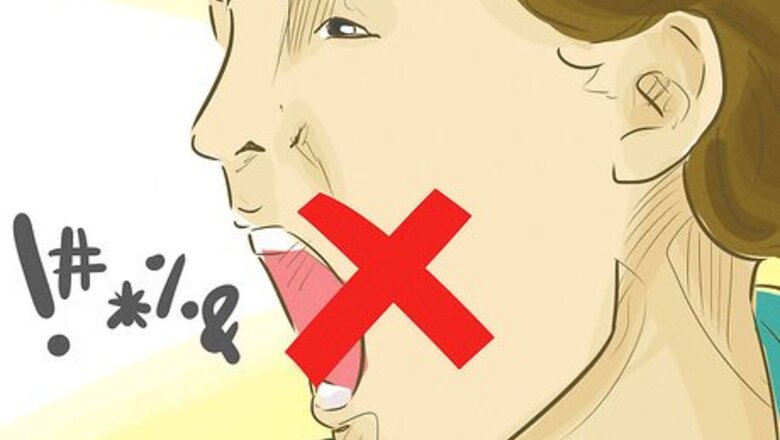
views
This article is targeted towards adults.
The article does not in any way encourage the use of the word. On the contrary, it is trying to limit its usage into very specific situations that might arise in closed, friendly social circuits where the use of the word will be more accepted. Most importantly, where the use of the word will not be considered offensive (most of the time).
The article is not child-friendly, but to be safe, will not use the full spelling of the word. Instead, F will be used instead of the word in examples, and F-ing, F-ed will be used instead of the word in examples to denote the various tenses.
Unaccepted Usage

Do not use the f-word if you are not an adult. Although there's no hard-lines or consensus on a certain age, the general recommendation will be: Never use the f-word if you are under the age of 13. Strongly avoid using the word if you are under the age of 18. Using the f-word might get you in serious trouble if you choose to use it while still under 18 (especially in schools or official gatherings).

Understand certain scenarios in which usage is unacceptable. These may include: Formal social settings in which professionalism is expected, such as work meetings. Conversations with a person to whom you have a professional and formal relationship. An intent to use the word as a swear or otherwise offensive way towards the person you are talking to.
Grammatical Alternatives and Their Usage

Know how to use the f-word as a noun. Usually, this is done by replacing a normal word with f to denote being annoyed Example: I don't give a f!/I don't give a f!

Use the f-word as an adjective. This usage is f-ing. The meaning intended might be positive or negative depending on the context, body language and face expressions (if applicable). Examples: "What a F-ing party!"/"XYZ is doing all the F-ing work!"

Know how to use it as a verb or action word. It can be used as a transitive, non-transitive, and passive verb. This usage can be dangerous as it usually can be understood, even by mistake, to denote the actual literal meaning. Usually, it can be used to denote messing something up. Depending on the context, it can denote betrayal, bad behavior, general messing up, or unapproved actions. Examples: "XYZ F-ed the whole thing!"/ "He F-ed his business partner by selling the secrets of the company!"

Understand the usage as an adverb. The f-word can be a powerful adverb by adding more character to an expression. (Adjective) Example: "XYZ parties too F-ing much." (Added character by stating how much)

In clauses and terms: F-word can be used in many de facto terms such as: F-ed up: usually meaning messed up. F-ed sideways: denoting being in a generally bad situation.
Generally Accepted Uses (For Adults)

Provide comic relief in relaxed, casual, and private conversations. If the conversation is too serious and you want to drive it back to a more relaxed one, you can use expressions containing the f-word sparsely. For example: "Man, that's F-ing deep!"

Express feelings of excitement or ecstasy. Some people insert the f-word within certain expressive words to add humorous improvisation. Examples: Fanf-ingtastic! (Fantastic) Absof-inglutely! (Absolutely) Inf-ingcredible! (Incredible) Asf-ingtonishing! (Astonishing)

Express disapproval. When the f-word is inserted, it will denote your disapproval in an indirect way. For example: "I f-ing love it when people accuse me of things like this."

Use it as an adjective to describe strong approval. In some social situations, this might be accepted or even welcome. However, this usually needs to be accompanied by facial expressions so as not to be misunderstood for the previous usage. Example: "Are you joking? I f-ing love soup!"



















Comments
0 comment